Marriage and family
Billy Modise married Yolisa Bokwe in 1964. They then went on to have three children, Bontle, Tshepo and Thandi.
Billy Modise | |
|---|---|
| Personal details | |
| Born | 18 December 1930 Bloemfontein, Orange Free State, Union of South Africa |
| Died | 20 June 2018 (aged 87) Johannesburg, Gauteng, South Africa |
| Political party | ANC |
| Spouse | Yolisa Modise |
| Occupation | Secretary-General of the African National Congress |
Billy Modise (18 December 1930 - 20 June 2018 [1] ) was a South African activist and diplomat. He was an African National Congress (ANC) veteran and ambassador.
Billy Modise was born on 8 December 1930 in Bloemfontein, [2] Orange Free State (now Free State Province).
He received an Anglican scholarship which enabled him to enrol for secondary school in Modeerport. After completing his schooling, between 1950 and 1955, Modise worked at a wholesale store and later for a medical doctor as a clerk to raise money to enable him to further his studies at university. In January 1955, he enrolled at the University of Fort Hare to study medicine. [2] As a student at Fort Hare, he came into contact with politicians such as Professor ZK Matthews and Govan Mbeki who inspired him to become politically active. He was elected Secretary of the ANC Youth League for the Fort Hare branch, and later served as secretary of the Student Representative Council. He also became a member of the National Union of South African Students (NUSAS) serving as an executive member. In 1959 he switched from studying medicine to a BA degree. [3]
While at Fort Hare University, the apartheid government introduced the University Extension Bill, which legalised tertiary segregation, forcing students of different races to go to separate universities. He was at the forefront of fighting against the bill but did not succeed. In January 1960, he was asked by NUSAS to attend a conference in Switzerland. [4] Fearing arrest, he initially declined, although after advice from his family and the ANC he then accepted. It was around that time that the Lund University Students Union in Sweden offered him a scholarship to go abroad and study medicine. While studying in Sweden, he started mobilizing college student formations against Apartheid and networking on behalf of the ANC. He was a founding member of the South African Committee in Lund alongside Lars-Erik Johansson and Ulf Agrell. [5] The Committee convened meetings, printed publications, leaflets and campaigned parliamentarians to help the battle against Apartheid.
Between 1960 and 1972, Modise travelled across Europe in an attempt to mobilize people in Finland, Denmark and Norway to boycott all South African products. [4]
In 1966, the ANC Youth and Student Section (ANC YSS) was formed, with former President Thabo Mbeki as leader in the United Kingdom. ANC YSS later played critical roles in the country's transition to a democracy. [4] The leadership of the ANC YSS included Billy Modise, Joe Nhlanhla who later became Mbeki’s first minister of intelligence and was the chair of the ASA (The African Students Association) in Moscow and Union of Soviet Socialist Republics (USSR), Jackie Selebi along with many others. [6] The ANC YSS had two main objectives: looking after the welfare of the ANC youth and mobilising youth against apartheid internationally
In 1975, he was redeployed to the United States to work in New York for the United Nations Human Settlements Programme (UN-Habitat)‚ where he was preparing policy papers on resettlements. From 1976 to 1988‚ he also worked for the UN‚ training exiled Namibians in political science‚ sociology and education‚ among other courses.[ citation needed ]
In 1988, he left the UN to work for the ANC full-time. [2] He was sent back to Sweden as chief representative of the ANC. Modise returned to South Africa in 1990 and was deployed at the ANC head office in Johannesburg. In 1991 he was tasked with heading the Matla Trust‚ which had been established to prepare for the 1994 elections at the then Shell House ANC headquarters. After the first democratic elections, he was posted abroad as South Africa's High Commissioner to Canada in 1995, to become democratic South Africa's first black High Commissioner. [6] He also served as the Chief of State Protocol under President Thabo Mbeki from 1999 to 2006. Modise served on a number of boards, including those of South African Airways and Kgodiso Investments.[ citation needed ]
Billy Modise married Yolisa Bokwe in 1964. They then went on to have three children, Bontle, Tshepo and Thandi.
Modise was a recipient of the annual Ubuntu Awards, [7] which recognise South African industry leaders and distinguished persons for their distinguished service and contribution to promoting South Africa's national interests and values across the world.
In 2008, Ambassador Modise received the Order of Luthuli – Silver Class from former President Thabo Mbeki for excellent contribution in the achievement of a South Africa free of racial oppression and contributing to the building of a non-racial, non-sexist and democratic South Africa. [7]
He also received the Premier's Excellence Award from the Premier of the Free State for his contribution towards the liberation struggle and South Africa in general. [7]
On 16 November 2017, the Swedish Ambassador to South Africa, Cecilia Julin, at the decision of King Carl XVI Gustaf of Sweden, bestowed the Order of the Polar Star on ACCORD Trustee ambassador Billy Modise. [7]
Ambassador Modise was a member of ACCORD’s Board of Trustees from 2007 until his death in June 2018. [7]
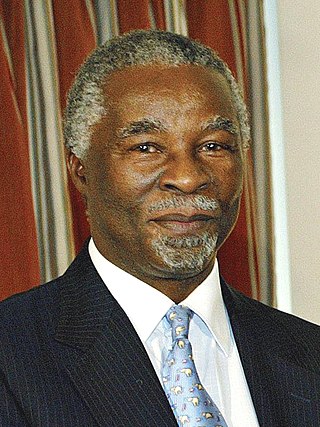
Thabo Mvuyelwa Mbeki is a South African politician who served as the 2nd democratic president of South Africa from 14 June 1999 to 24 September 2008, when he resigned at the request of his party, the African National Congress (ANC). Before that, he was deputy president under Nelson Mandela from 1994 to 1999.
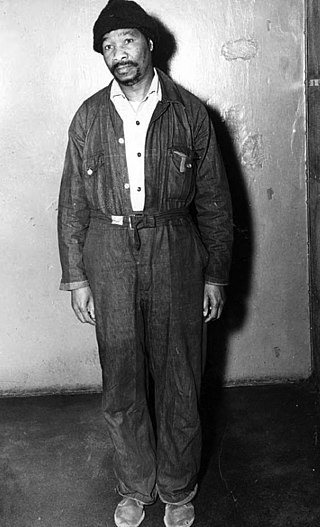
Govan Archibald Mvunyelwa Mbeki was a South African politician, military commander, Communist leader who served as the Secretary of Umkhonto we Sizwe, at its inception in 1961. He was also the son of Chief Sikelewu Mbeki and Johanna Mahala and also the father of the former South African president Thabo Mbeki and political economist Moeletsi Mbeki. He was a leader of the South African Communist Party and the African National Congress. After the Rivonia Trial, he was imprisoned (1963–1987) on charges of terrorism and treason, together with Nelson Mandela, Walter Sisulu, Raymond Mhlaba, Ahmed Kathrada and other eminent ANC leaders, for their role in the ANC's armed wing, Umkhonto we Sizwe (MK). He was sometimes mentioned by his nickname "Oom Gov".
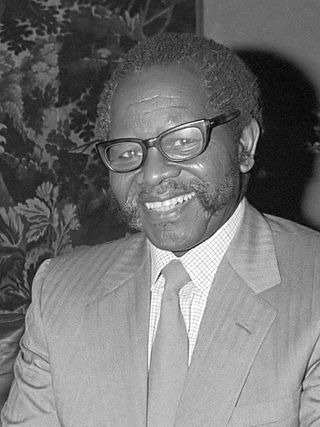
Oliver Reginald Kaizana Tambo was a South African anti-apartheid politician and activist who served as President of the African National Congress (ANC) from 1967 to 1991.
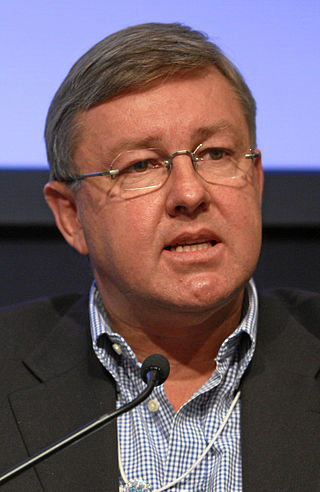
Marthinus Christoffel Johannes van Schalkwyk is a South African politician, academic, and lawyer, who serves as High Commissioner to Australia. He previously served as MP and Minister of Tourism in the Cabinet of South Africa. Formerly Premier of the Western Cape and Leader of the Opposition in the Parliament of South Africa, he was the leader of the New National Party from its inception on 8 September 1997 until its dissolution on 9 April 2005. He was appointed Minister of Environmental Affairs and Tourism in the Thabo Mbeki administration after merging his party with the ruling African National Congress (ANC), despite the poor performance of the former in the 2004 General Election.
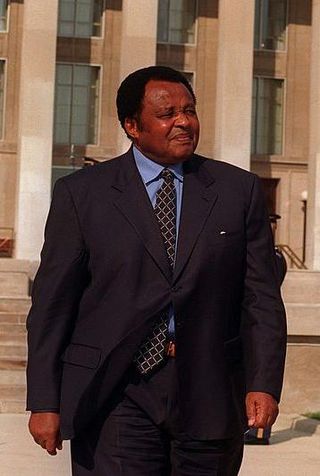
Johannes "Joe" Modise was a South African political figure. He helped to found uMkhonto we Sizwe, the military wing of the African National Congress, and was its longest serving Commander in Chief, deputised at different points in time by Joe Slovo and Chris Hani. Modise headed MK for a 25-year period, from 1965 to 1990. He served as South Africa's first black Minister of Defence from 1994 to 1999 and led the formation of the post-independence defence force.

Nyameko Barney Pityana FKC GCOB is a human rights lawyer and theologian in South Africa. He is an exponent of Black theology.
The South African Students' Organisation (SASO) was a body of black South African university students who resisted apartheid through non-violent political action. The organisation was formed in 1969 under the leadership of Steve Biko and Barney Pityana and made vital contributions to the ideology and political leadership of the Black Consciousness Movement. It was banned by the South African government in October 1977, as part of the repressive state response to the Soweto uprising.

Ebrahim Rasool is a South African politician and diplomat who served as the South African Ambassador to the United States from 2010 to 2015, as a Member of the National Assembly from 2009 to 2010, and as the 5th Premier of the Western Cape from 2004 to 2008. He is a member of the African National Congress and has held various leadership positions in the party.

Mosiuoa Gerard Patrick Lekota is a South African anti-Apartheid revolutionary for the African National Congress (ANC) who served jail time with Nelson Mandela from 1985 and who left the ANC to form the Congress of the People (Cope) splinter party in 2008. He has served as its President since 16 December 2008.

Brigitte Sylvia Mabandla is a South African politician, lawyer and former anti-apartheid activist who served in the cabinet of South Africa from 2003 to 2009, including as the Minister of Justice and Constitutional Development from 2004 to 2008. She became the South African Ambassador to Sweden in January 2020. A veteran of the African National Congress (ANC), she was an elected member of party's National Executive Committee between 1997 and 2012.
The National Union of South African Students (NUSAS) was an important force for liberalism and later radicalism in South African student anti-apartheid politics. Its mottos included non-racialism and non-sexism.
Makhenkesi Arnold Stofile was a South African politician and anti-apartheid activist who served as the second Premier of the Eastern Cape from 1997 to 2004. After that, he was Minister of Sport and Recreation from 2004 to 2010. He was also a member of the National Executive Committee of the African National Congress (ANC).

South Africa since 1994 transitioned from the system of apartheid to one of majority rule. The election of 1994 resulted in a change in government with the African National Congress (ANC) coming to power. The ANC retained power after subsequent elections in 1999, 2004, 2009, 2014, and 2019. Children born during this period are known as the born-free generation, and those aged eighteen or older, were able to vote for the first time in 2014.
The 52nd National Conference of the African National Congress (ANC) was held in Polokwane, Limpopo, from 16 to 20 December 2007. At the conference, Jacob Zuma and his supporters were elected to the party's top leadership and National Executive Committee (NEC), dealing a significant defeat to national President Thabo Mbeki, who had sought a third term in the ANC presidency. The conference was a precursor to the general election of 2009, which the ANC was extremely likely to win and which did indeed lead to Zuma's ascension to the presidency of South Africa. Mbeki was prohibited from serving a third term as national President but, if re-elected ANC President, could likely have leveraged that office to select his successor.
The National Executive Committee (NEC) of the African National Congress (ANC) is the political party's highest decision-making body in between its party conferences. It serves as the primary executive organ responsible for leading and governing the ANC, directing the party’s policies, strategies, and overall operations. The NEC is elected every five years at the ANC’s National Conference and consists of 87 members, including the party's top officials, such as the president of the ANC, deputy president, chairperson, secretary-general, two deputy secretaries-general, and treasurer-general.
Lulama Smuts Ngonyama is a South African diplomat who previously served as South Africa’s Ambassador to Spain and currently to Japan, and a former head of communications for the African National Congress (ANC) in South Africa. He was born in Uitenhage, attended school in Fort Beaufort and graduated from the University of Fort Hare.
Zanele Mbeki OMSS is a feminist South African social worker who founded the Women's Development Bank. She is also a former first lady of South Africa.
Lindiwe Mabuza was a South African politician, diplomat, poet, academic, journalist, and cultural activist. She was an anti-apartheid activist who went on to serve her country as a member of the first democratically elected parliament of South Africa. She then proceeded to a career as a distinguished diplomat. She served on the Advisory Board of Elders of the Ifa Lethu Foundation, which repatriates South African artworks. She was a patron of Dramatic Need, a United Kingdom–based charity that promotes creative arts for children, and was an advisory Council Member of the Thabo Mbeki Foundation. She served as the chairperson of the Nelson Mandela Children's Fund UK.

Devikarani Priscilla Sewpal Jana was a South African human rights lawyer, politician and diplomat. As a member of the African National Congress (ANC) during the anti-apartheid movement, she participated in both legal activism as well as in the underground movement to end apartheid. She represented many significant figures in the movement, including South African president Nelson Mandela, Winnie Madikizela-Mandela, Steve Biko, Govan Mbeki, Walter Sisulu, and Archbishop Desmond Tutu. Jana was one of the very few South Africans who had access to political prisoners, including Mandela, in the maximum security Robben Island prison, and served as an emissary for coded messages between the political prisoners and the ANC leadership.
Papi Otukile Moloto was a South African politician and former anti-apartheid activist. A veteran of Umkhonto we Sizwe (MK), he represented the African National Congress (ANC) in the National Assembly from November 2008 to May 2009.
{{cite web}}: CS1 maint: archived copy as title (link)